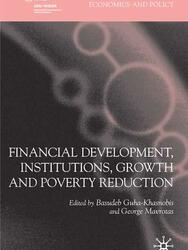Book
Financial Development, Institutions, Growth and Poverty Reduction
This volume explores the various linkages between financial development, institutions, growth and poverty reduction in low-income and transition countries. It is the result of a two-year research project undertaken by UNU-WIDER, and the strong range of contributions present a significant variety of experiences in this important research area. The book contains both cross-country and panel study results, with country case studies from Africa and Asia. Theoretical models are complemented with applied cases, and evidence draws on both macro and micro household level data. The book also identifies key transmission mechanisms between financial development and (pro-poor) development. This volume combines different (quantitative) research methodologies using household data, and innovative theory, and will be of great interest to all academics and practitioners active in this area.
 Join the network
Join the network